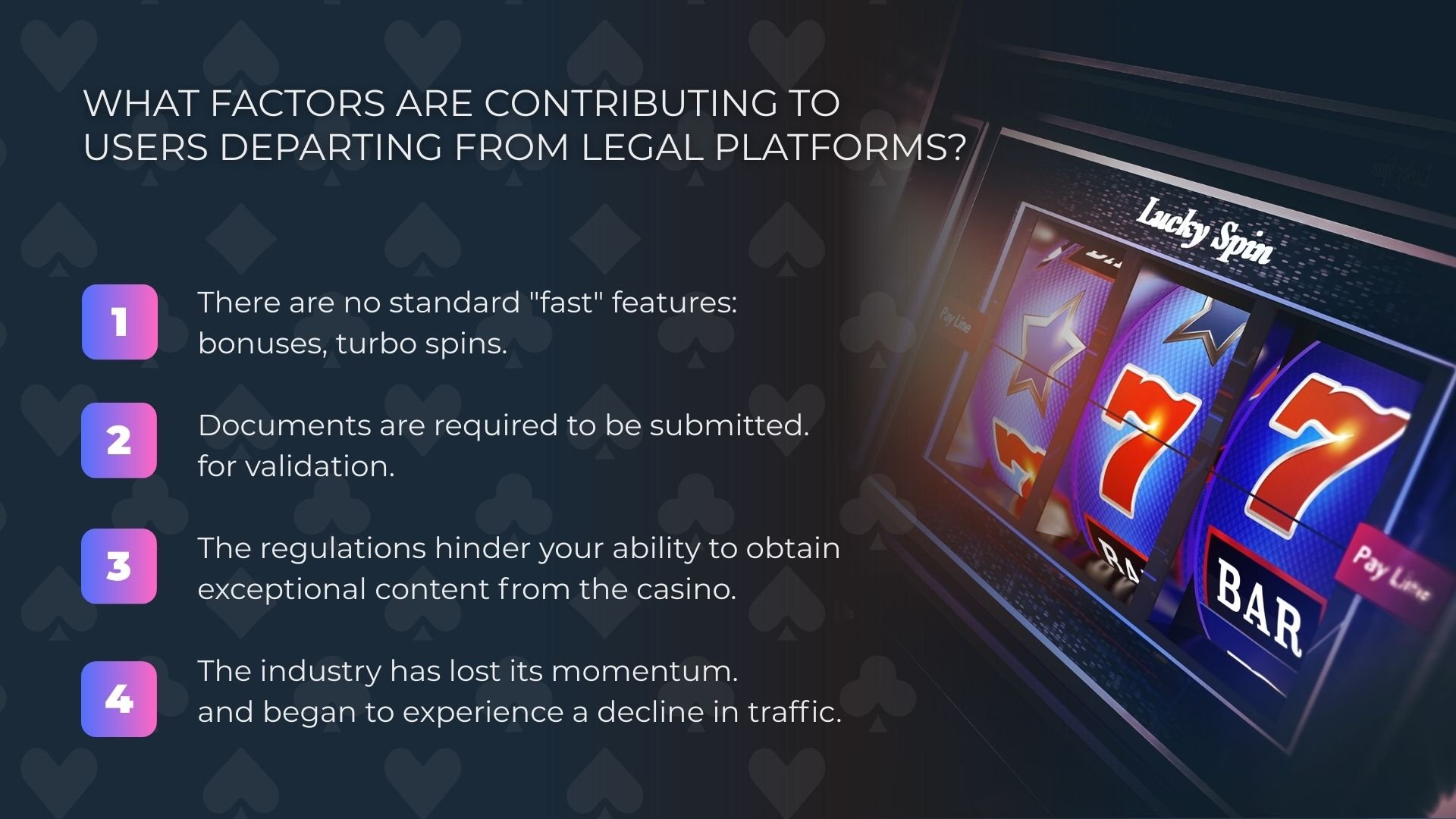 Tighter regulations, efforts to curb addictive behavior, bans on specific features and tools—all of this is leading not only to reduced activity on licensed platforms but also to a large-scale migration of users to the illegal market.
Tighter regulations, efforts to curb addictive behavior, bans on specific features and tools—all of this is leading not only to reduced activity on licensed platforms but also to a large-scale migration of users to the illegal market.
According to the latest report by Deal Me Out, published on April 9, this shift is primarily driven by a combination of three factors: strict regulation, lack of legal access to cryptocurrency betting, and aggressive promotion of unlicensed platforms by streamers and influencers. These are key considerations for anyone exploring how to start an online casino targeting international markets.
Key Findings of the Report
The report is based on survey data from over 1,250 minors, 300 adult players, and 10 streamers and content creators who regularly engage with audiences in the online gambling space. Key observations include:
- Up to 5 million monthly clicks on social media go through affiliate links to unlicensed platforms.
- 90% of surveyed content creators reported using BC Game—a platform previously operating under a white-label model but no longer licensed in the UK.
- The illegal sector shows high levels of engagement among underage users—an estimated 420,000 British schoolchildren access black-market platforms, including through in-game mechanics and crypto casinos.
- In a restricted legal environment, streamers openly promote the use of VPNs and circumvention tools to access banned content and maintain the appeal of their shows.

Risks and Vulnerabilities
The growing shift toward the black market is not only driven by user behavior but also by the structure of the regulatory framework. New restrictions—including deposit and betting limits, mandatory identity verification, and access controls—are perceived by many as overly burdensome.
The result is a decline in user experience and waning interest, particularly among the 18–30 age group. As a consequence, illegal platforms are gaining popularity by offering features banned on licensed sites: rapid spins, bonus mechanics, and a high level of anonymity.
Entrepreneurs looking to buy casino software or find technical solutions to bypass regulatory hurdles are increasingly drawn to such formats as well.
Influencer Involvement: A New Pressure Point
Influencers, especially streamers on platforms like YouTube and TikTok, have become key traffic drivers toward the unlicensed sector. The open promotion of crypto casinos, links to sites that bypass identity checks, and calls to “support the creator” have created an economically viable model where legal status takes a backseat to reach and monetization.
One content creator quoted in the report stated:
“Regulation forced us to switch to crypto casinos. Without them, we simply can’t compete. The audience demands dynamic content, and current rules make that impossible.”
For those considering launching a business in this niche, such cases raise serious questions—from the legality of promotional channels to the choice of providers, whether buying a casino script or commissioning a turnkey solution. 
Minors in Focus: A Growing Trust Crisis
Particular concern is raised by the involvement of underage users. According to the report, teenage participation in gambling is increasingly becoming a form of social group activity, embedded in everyday digital culture via platforms like Discord, video games, and streaming services.
Regulators now face a dual challenge:
- Low public awareness about the legal status of platforms: many users can’t distinguish between regulated and unregulated sites.
- Rapid reappearance of blocked websites: mirror sites and new domains make enforcement ineffective without large-scale, systemic solutions.

Deal Me Out Recommendations: A Path Toward Sustainable Regulation
The organization proposes several measures to curb the expansion of the black market:
- An urgent review of regulations concerning cryptocurrency betting.
- A nationwide awareness campaign to educate the public on the risks of illegal platforms and how to identify scams.
- Consideration of the unintended consequences of overregulation when drafting new rules: excessive pressure on users may fuel the growth of the shadow sector.
According to a parallel report from the Betting and Gaming Council (BGC), the illegal gambling market in the UK is estimated at £2.7 billion annually, with £695 million coming from users who have completely abandoned licensed operators.

Conclusion: Digital Economy and the Other Side of Regulation
The rise of the black-market gambling industry is not only a challenge for regulators—it’s also a critical signal to anyone involved in launching an online business, working in digital content, gaming, or fintech.
For entrepreneurs planning to launch an online casino, it is now more important than ever to consider not only the technological side of the project but also the legal risks, information security, and evolving regulatory trends.
Regulation is not just about restrictions. It’s the framework in which trust is built. And when that framework fails to account for real behavioral patterns, the market starts operating under its own rules—often outside the bounds of legal oversight.
Without considering these factors, any attempt to “tighten controls” ends up merely pushing activity toward less regulated—and riskier—territories.






